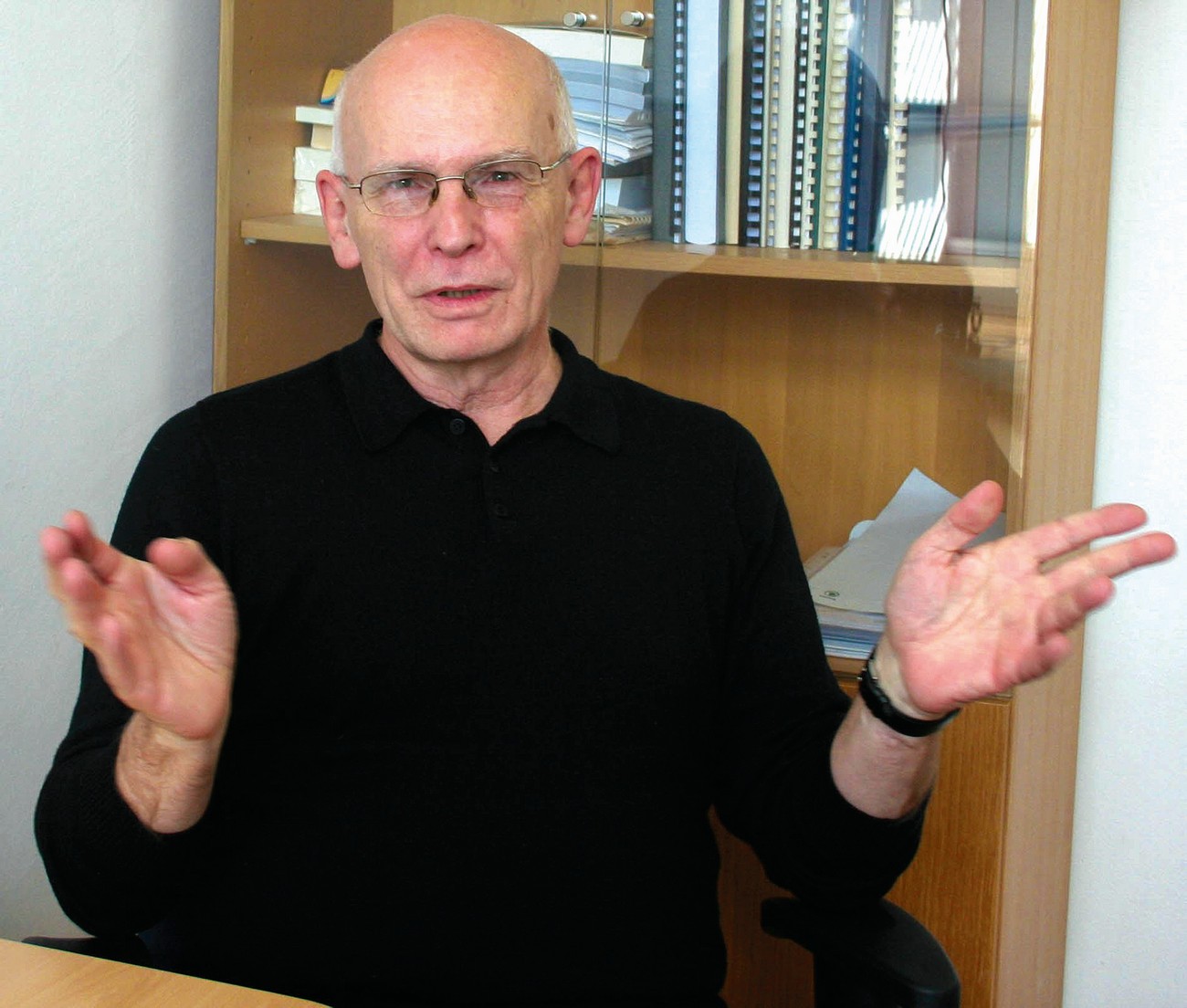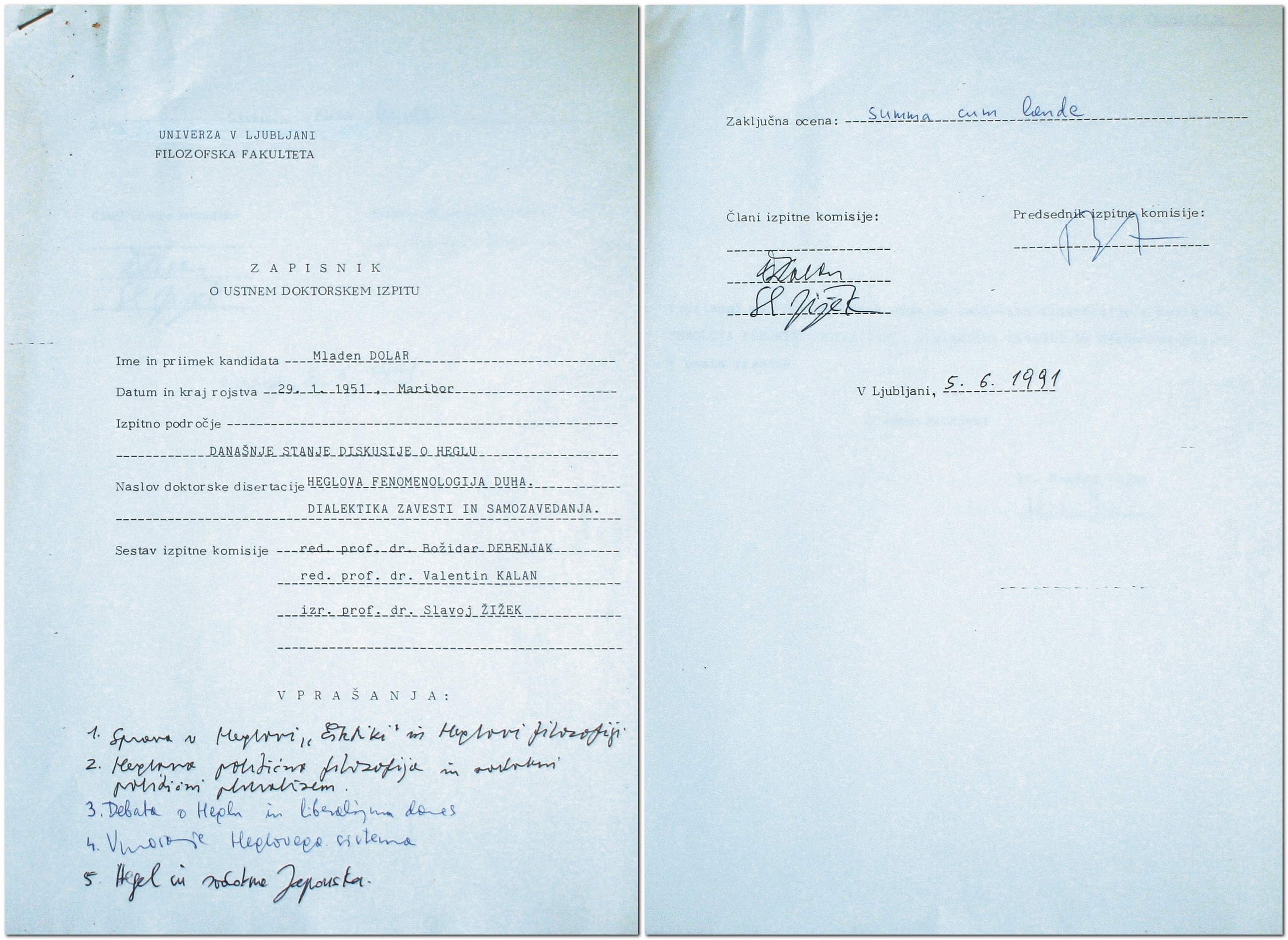
The Philosophical Trinity: MLADEN DOLAR, philosopher (1992)
Hegel's Phenomenology of the Spirit: A Dialectic of Consciousness and Self-Awareness. Mentor: Božidar Debenjak. Promotion: June 30, 1992
He lectures at the Department of Philosophy, and as a visiting professor at many universities abroad. He is particularly concerned with German classical philosophy, structuralism, theoretical psychoanalysis, and music philosophy. He is the co-founder of the Society for Cultural Research, and the co-founder and long-time Vice-President of the Society for Theoretical Psychoanalysis. He is one of the most prominent representatives of the Ljubljana Philosophical School with Slavoj Žižek and Alenka Zupančič.

Mladen Dolar in his office at the Faculty of Arts, which he shares with ten other researchers.
Božidar Debenjak, philosopher, mentor to Slavoj Žižek and Mladen Dolar and a panel member for the defense of Alenka Zupančič Ph.D. :
When you ask me about philosophy and the schools of philosophy, I have to reiterate what I told the students at the admissions talks. I told them this truth: philosophy is a house of many rooms. These rooms are not without communication, but they are rooms in which philosophical research is conducted. They are not to be placed in a hierarchical order. Even the school I fancy is one of the rooms in the house of philosophy. This is the school represented by Slavoj Žižek, Mladen Dolar and Alenka Zupančič. It does not mean that I became their believer; I am their reader. And I read their texts with pleasure. Their room is one of the beautiful ones and their school was fortunate enough to penetrate the global audience and present its lessons. I am glad that I was able to contribute to its formation even before it was established as an independent school; that is at a time when its members were receiving scientific habilitation. Above all, I am pleased that they have brought the importance of philosophical thought that originated in Slovenia to the world.
Alenka Zupančič, philosopher
Slowly, a special bond that was both friendly and ideological started to form between the three of us; that is, Mladen Dolar, Slavoj Žižek and myself. I believe one would not function without the other. /.../ We performed together in various forms on several occasions, which has become known as a troika of the Lacanian School. That label came from the outside and people were even convinced there was an institution, a building ...
Mladen Dolar, philosopher
Why does our "Philosophical School of Ljubljana" remain so popular? Philosopher Alain Badiou talks about trying to be faithful to a thought event in a particular time, at the time of the outbreak of French structuralism. Our strength is in remaining loyal to that thought event and connecting it to the whole Hegelian heritage, pulling the consequences for the current times. We do not repeat the forms that were possible and available at the time; on the contrary, they constantly demand reinvention. We are a group, we support each other, and thinking is both our collective endeavor and the essence of our work.

Minutes of Mladen Dolar's exam, which he completed with the highest honors before the commission composed of Božidar Debenjak, Valentin Kalan and Slavoj Žižek.
I defended my Ph.D. in 1991 during the period of independence. The topic was Hegel's Phenomenology of the Spirit: A Dialectic of Consciousness and Self-Awareness. Phenomenology of the Spirit is one of the most difficult books in the entire philosophical tradition. My mentor was Professor Božidar Debenjak. I belong to the philosophical generation formed during the revolutionary period of French structuralism, and by the Frankfurt School.
The Frankfurt School relied heavily on Hegelian heritage, while French structuralism stood completely opposite, having an anti-Hegelian common denominator. It seemed that we were formed through two mental orientations, two schools of thought that were incompatible. My Ph.D. is a Lacanian reading of Hegel. I tried to do the impossible by linking the conceptual tools, the thinking tools of French structuralism to the whole Hegelian heritage, and make a story out of it. This path was first paved by Slavoj Žižek. Hegel, who is the last metaphysicist in the history of philosophy (it is called "metaphysics from Plato to Hegel" in philosophy), is an absolutely crucial reference. At the same time, he is the first post-metaphysical philosopher to stand precisely at this precipice.
It is a turning point that needs to be rethought every time. The thought tools given to us by French structuralism, including psychoanalysis and Lacan, are the ones that made it possible to reactivate this Hegelian heritage. That was the foundation of my Ph.D., which was published in two books in 1991 and 1992. In 2017, they were reprinted in one volume with the title Hegel's Phenomenology of the Spirit. Today, I am still pursuing the same path that my Ph.D. started, and I am still true to it, though nowadays, I see things in a slightly different light. I do remain faithful to the starting point.